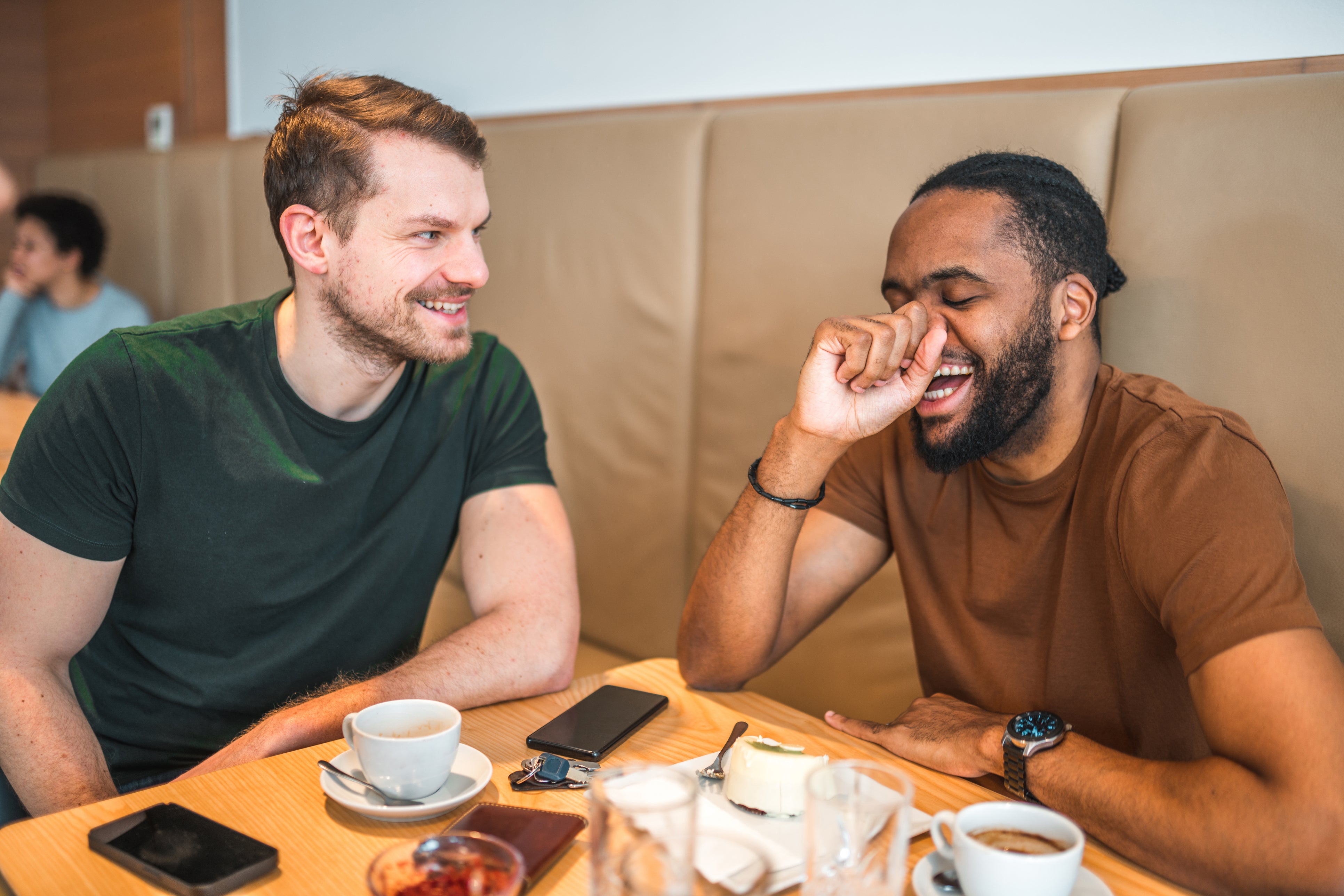
It is 8am on a Wednesday. I unlock my phone and launch my opening salvo.
“You have sad eyes like Maggie Gyllenhaal and your arms are steaming, tumescent hams.”
I sit in silence, waiting patiently for the reply. A few minutes later, my phone buzzes.
“You have spindly body like aluminium poured into ant colony.”
The game is on. The recipient of my message is James, a friend of several decades.
“You are a sloppy Venus of Willendorf made of Charlie Bigham’s ready meals.”
“You ruminate your stomach contents like cow.”
“You are Clapham bufo toad. Women lick you and become deranged.”
“You use footstool to defecate.”
“You cradled the husk of a lobster as a child.”
The rules of the game are simple: you must insult your friend. You must be creative and deeply personal. If you laugh, you are playing correctly. If you are offended, you lose.
The masculine urge to roast other men is a force that rarely receives attention, but it is the foundation of my strongest relationships. I have sustained entire long-distance friendships for decades on the back of crude psychological warfare, sometimes without even pausing to ask about my friend’s health, job, family or sex. My default – and by implication, most comfortable – way of communicating with my closest friends also happens to be the least informative, and the most abusive. The question is: why do men like me enjoy roasting each other so ruthlessly?
“It’s like playing basketball one-to-one,” says Cary Cooper, a psychologist and chartered member of the British Psychological Society. “You’re competing with that person in terms of wit. It’s not necessarily negative, because you can engage in that game or you don’t have to. But on the other hand, you might do it. You might enjoy it.”
I do enjoy it. For no particular reason, I drop a deeply compromising photo of James into a group chat. It causes chaos and consternation. I am delighted. He responds with a picture of me emerging from an ice bath naked. It is a deeply unflattering photo. He is winning this round.
“That’s natural male competitiveness,” says Cooper. “Women don’t do that with other women.”
Surely this is true: few women would do this. The knowledge of this girds my loins and fuels my thirst for repartee. My female friends tell me that I am terribly mean to James. They have, in the past, tried to erect a banter barrier between us. They have attempted to console us and explain that we are hurting each other. But I feel no pain; only the urge to lob grenades.
“There is an old adage,” says John Barry, co-founder of the Centre for Male Psychology. “Men bond by insulting each other but they really don’t mean it, and women bond by complimenting each other but they really don’t mean it.

“Men in general don’t necessarily want to go around offering too many compliments to blokes, especially something like ‘Your hair looks particularly radiant in the sunshine,’ in case it gets taken in a way that wasn’t intended.”
I am not averse to complimenting James. I could simply tell him I love him, and this would be true. But man-to-man, day-to-day, this would ring hollow. A man must demonstrate his love by saying something so personal and indefensible that it could never have come from anyone else.
“You don’t banter with your enemies,” says Barry. “You banter with your friends.”
Direct confrontation in this way is strangely intimate because it would be incredibly risky if it were taken the wrong way. Men who do not know each other avoid confrontation. They barely even face each other when they talk; they stand shoulder to shoulder, at a 120-degree angle – something that is impossible to ignore once you notice it.
Once you intimately understand another man’s psychology, there is an art to creating an insult that wounds and delights simultaneously. When I tell James he reminds me of the lead in Triangle of Sadness because he has negative canthal tilt, affluenza and a victim complex, I am saying to him: “Nobody knows you better than I do.”
When I send James a story about a Rwandan man who hasn’t left his home in 55 years due to an extreme fear of women, with the caption “Is this you?” I am telling him: “I am thinking of you.”
Perhaps direct expressions of love feel uncomfortable because they are just not very typical in our culture. In the film Challengers, two young men are locked in a psychological game of one-upmanship that transcends all else – including their competitive tennis careers and their pursuit of a third-wheel love interest played by Zendaya. In the closing scenes of the film, the men furiously embrace in mid-air at the tennis net in a spectacular climax of aggression and love that enrages Zendaya’s character because it betrays an intimacy that she cannot control. This film is frequently interpreted as homoerotic; to me, though, it is a good representation of the rivalry that underscores the unstated, platonic love between two men.
It’s true that sometimes banter-prone Britain can feel saturated with irony. Not all countries seem to be inclined to a culture of mutual ridicule, but in the English-speaking Western world, it is a way of life. In Britain, some of the banter that you get “is maybe a bit harsher than in other parts of the world”, according to Barry. The reasons for this are historical, and possibly evolutionary, he says.

“Men have traditionally worked in harsh environments, and as the protectors of communities – putting themselves in dangerous situations. If you are in the trenches waiting for the enemy to attack, it’s probably best you don’t share your feelings and burst into tears, telling everyone how terrified you are of dying and never seeing your family again. That might just spread panic or be distracting and bad for morale. Some gallows humour, or teasing, might work better and be more appreciated by others.”
Most men seem to get their initiation into banter in the playground. I have visceral memories of this at school, when I was simultaneously hurt and impressed by the creativity with which one of the other children cut me down to size. Decades later, he is one of my closest friends.
“Yes, some boys and young men love to roast each other,” says Rebecca Cant from Brook, a charity that offers education sessions and training around sex and relationships in schools. “In some groups, it seems to go on non-stop.”
“Roasting reflects how many boys manage emotions. Research suggests that boys, on average, have poorer emotional literacy than girls during childhood and adolescence.”
Some may be concerned to hear that boys are being socialised into ribbing each other from an early age. Could this kind of masculinity be harmful?
“At Brook, we don’t use the term ‘toxic masculinity’ because it is unhelpful. It is stigmatising, and oversimplifies complex issues,” says Rebecca.
“While roasting is a valid way to bond, it’s one that avoids vulnerability. There is nothing wrong with friends enjoying joking around. When roasting crosses a line too often, or becomes bullying, that is harmful. It requires the skill to judge what’s a safe joke versus crossing the line and to be able to read the room.”
It’s a relief to know that James and I share a valid bond, and not one that has been nurtured on a bedrock of mutual sadism and hostility. But if our friendship ever gets stale, I have an article filled with kompromat just waiting to be written.
The biggest trends from RHS Chelsea Flower Show 2025
Influencer Saffron Barker is ‘grateful to be alive’ after robbery on US road trip
Live in an area built mainly from concrete? You might develop this condition
Man loses wife and son to same heart condition: ‘I feel robbed’
Barbara Windsor’s widower defends new relationship: ‘I believe she would be happy’
Reform voters enjoy more dating app success than Tories, study finds







